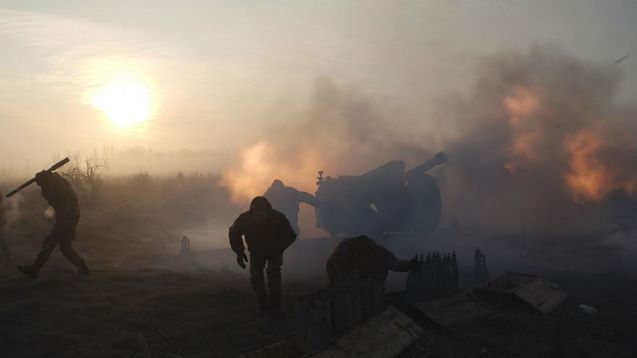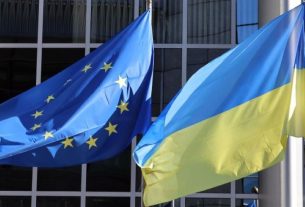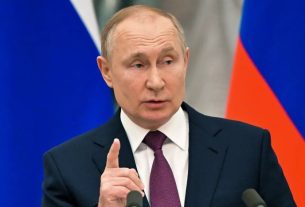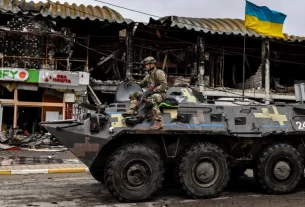KHARKIV – Russian forces have withdrawn from key eastern towns, as a rapid Ukrainian counter-attack makes further gains. Ukrainian officials said troops entered Kupiansk, a vital eastern supply hub for Russian forces, on Saturday.
Russia’s defence ministry then said its troops have retreated from nearby Izyum to allow them “to regroup”.
The ministry also confirmed the withdrawal of troops from a third key town, Balaklyia, in order to “bolster efforts” on the Donetsk front.
The Ukrainian advances – if held – would be the most significant since Russia withdrew from areas around Kyiv in April. Izyum was a major military hub for the Russians, and was subject to intense fighting in the early stages of the invasion.
“A three-day operation was carried out on the drawdown and organised transfer of the Izyum-Balakliya group of troops to the territory of the Donetsk People’s Republic,” the Russian statement said.
“In order to prevent damage to the Russian troops, a powerful fire defeat was inflicted on the enemy.”
Shortly afterwards, the chief administrator of Russian-controlled parts of the Kharkiv region recommended that its residents evacuate to Russia “to save lives”, according to the Russian state-run TASS news agency.
And the governor of the neighbouring Belgorod region, in Russia, said mobile catering, heating, and medical assistance would be available to people queuing to cross the border. The advances will be used as a sign that Ukraine’s army can take back Russian-occupied territory, while the country continues to ask for military support from the West.
For Russia, the Ukrainian gains – if secured – would mark a humiliating setback, as its forces invaded captured the area in the first week of the war.
Earlier, UK defence officials said Ukraine had advanced 50km (31 miles) into previously Russian-held territory. “Russian forces were likely taken by surprise,” the UK Ministry of Defence said. “The sector was only lightly held and Ukrainian units have captured or surrounded several towns.”
Ukraine launched its counter-offensive in the east earlier this week, while international attention was focused on an anticipated advance near the southern city of Kherson. Analysts believe Russia redirected some of its most seasoned troops to defend the city. But as well as gaining ground in the east, Ukraine is also making gains in the south, an official said.
Nataliya Gumenyuk, a spokesperson for the Ukrainian army’s southern command, said they had advanced “between two and several dozens of kilometres” along that front. But Russian forces fighting on the southern front are said to have dug into defensive positions, and Ukraine’s troops have faced heavy resistance since the offensive began. Ukrainian officials shared a picture on social media that appeared to show Ukrainian troops holding up the country’s flag in front of Kupiansk city hall, with the Russian flag at their feet. “We are moving forward,” General Valeriy Zaluzhnyi, commander of Ukraine’s armed forces, wrote in a Facebook update on Friday afternoon.
“We clearly know what we are fighting for and we will definitely win.”
Speaking from Kyiv during his nightly address, Ukraine’s President Volodymyr Zelensky said his forces are “gradually taking control of new settlements” and “returning the Ukrainian flag and protection for all our people”.
Earlier on Saturday, the Russian-appointed head of Kharkiv region, Vitaly Ganchev, said his troops had started to evacuate civilians in Kupiansk and Izyum.
Speaking in Brussels on Friday, US Secretary of State Antony Blinken said the attack was “demonstrably making real progress”.
“I think we can say that Ukraine is proceeding in a very deliberate way with a strong plan and critically enabled by the resources that many of us are providing,” Mr Blinken said.
Mr Zelensky also said during his address that national police units were returning to liberated settlements and urged civilians to report suspected Russian war crimes to them.
His call followed a report from the UN’s monitoring team in Ukraine which said they had “documented a range of violations against prisoners of war” by Moscow’s forces.
The report also accused Ukrainian troops of “cases of torture and ill-treatment of prisoners of war”.
Despite optimism in the east, Mr Zelensky observed in his address that “fierce battles” have continued in the Donbas.
Elsewhere, German Foreign Minister Annalena Baerbock arrived in Kyiv on Saturday in a surprise visit, which she said was to demonstrate Berlin’s commitment to Ukraine’s defence.
“I have travelled to Kyiv today to show that they can continue to rely on us,” Ms Baerbock said.
And on Friday, Mr Zelensky awarded the Order of Merit, Ukraine’s highest honour, to Haluk Bayraktar – the head of Turkish drone manufacturer Bayraktar.
The company’s TB2 combat drone, which can carry four missiles, has become a symbol of Ukrainian resistance.
While Ankara has sought to play the role of intermediary between Kyiv and Moscow since the conflict broke out, Mr Bayraktar has refused to supply Russia with arms and told CNN in August “we support Ukraine, support its sovereignty, its resistance for its independence”.__The Nation





